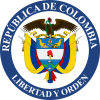Carlos Holguín Mallarino
Carlos Holguín Mallarino | |
|---|---|
 Oil painting by Ricardo Moros Urbina. | |
| Acting President of Colombia | |
| In office 7 August, 1888 – 7 August, 1892 | |
| Preceded by | Rafael Núñez |
| Succeeded by | Rafael Núñez |
| Minister of Foreign Affairs | |
| In office 4 June 1887 – 7 August 1888 | |
| President | Rafael Núñez |
| Preceded by | Felipe Angulo Bustillo |
| Succeeded by | Antonio Roldán Betancourt |
| In office 1877–1877 | |
| President | Aquileo Parra Gómez |
| Preceded by | Carlos Nicolás Rodríguez |
| Succeeded by | Eustorgio Salgar Moreno |
| Magistrate of the Supreme Court | |
| In office 1859–1880 | |
| Personal details | |
| Born | Carlos María Holguín Mallarino 11 July 1832 Nóvita, Chocó, New Granada |
| Died | 19 October 1894 (aged 62) Bogotá, Cundinamarca, Colombia |
| Nationality | Colombian |
| Political party | Conservative |
| Other political affiliations | National Party |
| Spouse | Margarita Caro Tovar |
| Relations | Manuel María Mallarino (uncle) Jorge Holguín (brother) Miguel Antonio Caro (brother-in-law) |
| Alma mater | Colegio San Bartolomé |
| Profession | Lawyer |
| Military service | |
| Allegiance | Conservative Party |
| Branch/service | Army |
| Rank | Colonel |
| Battles/wars | Colombian Civil War (1860–1862) Colombian Civil War of 1876 |
Carlos María Holguín Mallarino (11 June 1832 – 19 October 1894) was a Colombian lawyer, journalist, and politician, who became Acting President of Colombia between 1888 and 1892, acting in the absence of President Rafael Núñez.[1]: 131
Biographic data[edit]
This article or section appears to contradict itself. (May 2016) |
Carlos Holguín Mallarino was born on 11 July 1832, in the town of Nóvita, Chocó when the region was still part of the department (state) of Cauca. He died in Bogotá on 19 October 1894 while he was serving in Congress as senator.[1]: 131 Carlos Holguín Mallarino was part of the prominent Holguín, Mallarino and Caro Families. Both his uncle Manuel María Mallarino and his brother, Jorge Holguín, were Presidents of Colombia, as was his brother-in-law Miguel Antonio Caro, who succeeded him in office.[1]: 131, 217
Early life[edit]
Holguín completed his first years of education in the city of Cali, Valle. He then traveled to Bogotá, where he studied jurisprudence and obtained a degree in law at the Colegio Mayor de San Bartolomé before his 20th birthday. His adoptive grandfather, an Englishman called Paterson Saunders, had taught him Latin, Greek, English, French and Italian. Holguín later became a great[peacock prose] orator, debater, and writer. He was also a renowned journalist and professor of literature and history.[1]: 131
Military career[edit]
Holguín enlisted in the army and participated in several military actions like the uprising against President José María Melo, the war against Tomás Cipriano de Mosquera, and the conservative revolt against Aquileo Parra in 1875.[1]: 131
Political career[edit]
After Holguín graduated, he entered the civil service and held a few bureaucratic jobs with the central government. At 23, he was elected as state senator representing the district of buenaventura and thereafter as President of the Cauca State Senate. Later he was elected several times to National Congress, representing the States of Antioquia, Cundinamarca, Tolima and Bolívar. Holguín was appointed also to several ministerial positions such as Minister of Foreign Relations, Interior and War.[1]: 131
In 1881, while in Rome, Holguín was commissioned by President Rafael Núñez to establish diplomatic relations with the Kingdom of Spain. By that time, Colombia was the only Latin American nation that did not have diplomatic relations with Spain. Thus, Holguín was appointed as Special Envoy and plenipotentiary Ambassador of Colombia to the Kingdom of Spain. As head of the diplomatic mission, he arrives in Madrid on 9 January 1881, where he was greeted by the King of Spain, Alfonso XII. For the first time, full diplomatic relations were established between the two nations.[1]: 132
Upon his return to Colombia, on November 1887, Holguín was appointed Minister of Foreign Relations by President Eliseo Payán. Later, President Rafael Núñez appointed him Minister of War.[1]: 133
Presidency[edit]
Carlos Holguín became President of Colombia upon his election by Congress as Presidential Designate, the first time in 1888 and the second time in 1890. Thus, he ruled as president between 1888 and 1892, to complete the six years presidential term of President Rafael Núñez.[1]: 131
During his presidency, Holguín devoted time, energy and resources to the betterment of the nation’s infrastructure, such as the improvement, restoration and development of main highways, railways, shipyards, sea ports, the waterways of the Atrato, Cauca, Magdalena and Nechí rivers, and the electric and telephone grids. He also created and established the “Policia Nacional” (national police).[1]: 133
Holguín was very much disliked and heavily criticized by the opposition party, the liberals, and Congress made it very difficult for him to govern. In his last address to Congress, before he handed over the presidency to Miguel Antonio Caro, he said, "In the four years that I have governed, not a single shot has been fired, not a single drop of blood has been spilled and not a single tear has been shed. I leave the country in peace and I did not incur in further debt."[1]: 134
References[edit]
External links[edit]
- "Relación cronológica de Ministros" (in Spanish). Ministry of Foreign Affairs. 2006-08-07. Archived from the original on 2008-12-16. Retrieved 2008-12-13.
- Holguín Holguín, Carlos; Tomás Holguín Mora; Paula Torres Holguín (2005). "Camargo como Presidente de la República". Escritos, 1912-1998 (in Spanish) (1st ed.). Bogotá: Centro Editorial Universidad del Rosario. pp. 292–293. ISBN 958-8225-48-5. OCLC 68811847. Retrieved 2008-12-13.


 French
French Deutsch
Deutsch